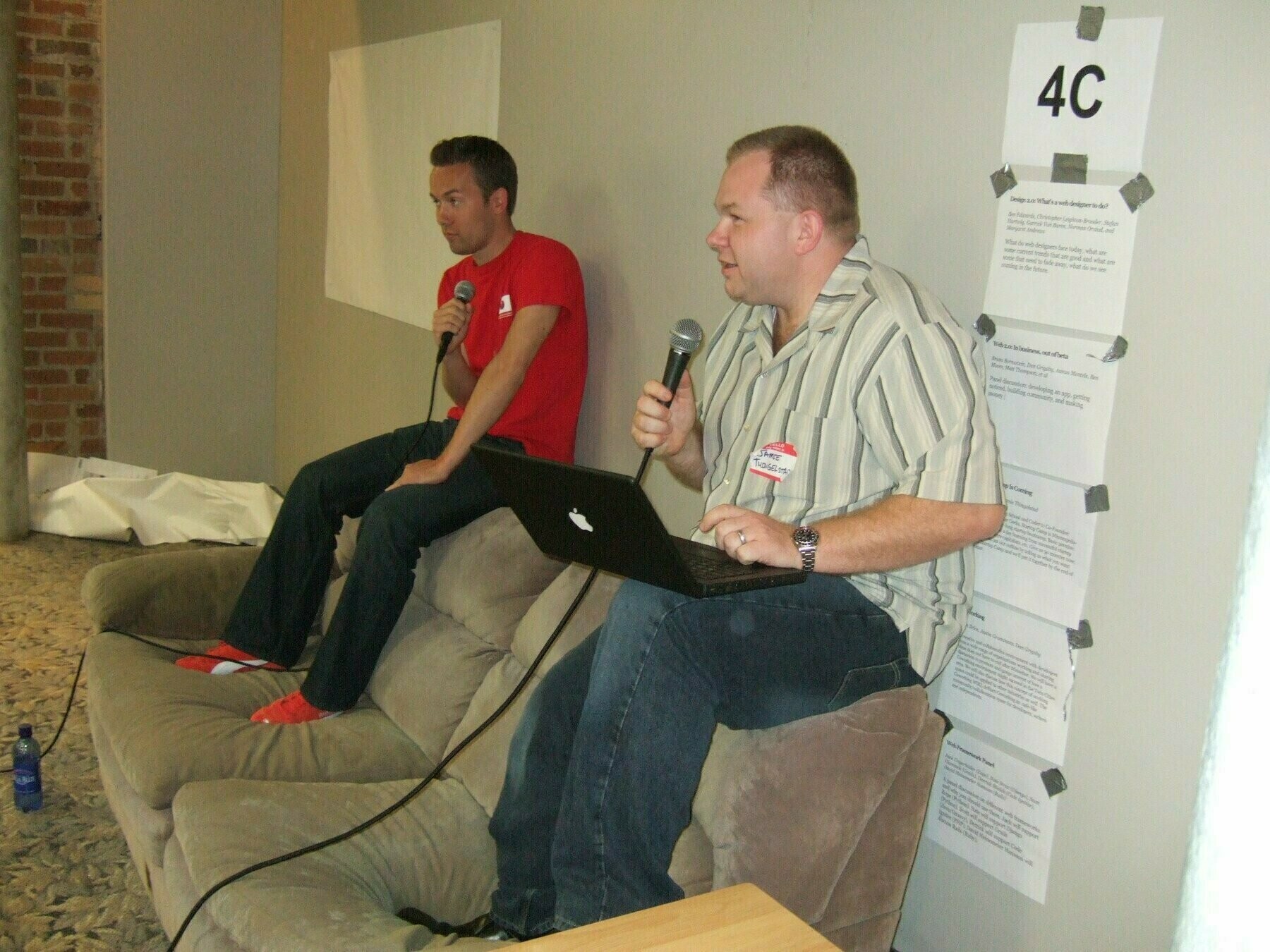Minnestar
Minnedemo 3 a Wrap
Does anyone know where the reference to Mo’ started? Like, we got our mo’ in the second half. Our products really selling, we’ve got mo’. Hiring is a breeze because we have mo’! If your not following here mo’ is momentum. After leaving Minnedemo 3 a couple weeks ago, it was clear that the Minneapolis technology community is building mo'.

I’m a bit late in writing about Minnedemo 2. Graeme Thickens did a thorough job in his post. Minnedemo continued it’s template of 15-minute demo’s from a variety of people working on interesting things. Notable this time was the CrashPlan demo from Matthew Dornquast at Code42. I’ve seen CrashPlan several times and have followed it’s progression from the sidelines. The product has really expanded and I think that Code42’s recent additions focused on businesses (using the E word, enterprises) is really smart and smartly built. Fanchatter also had a cool demo, although I’d tweak the product here and there. I don’t think they are going to hit that uber-viral point as is. There were also demos from SOTAcomm, Wonderfile, Pokeware and Adaptive Avenue. I missed much of the last half chatting with people I ran into at Minnedemo.
There were approximately 300 people at Minnedemo and it was great to see so many familiar faces. Having at O’Garas Garage was great to accommodate the size of the crowd, but people need to be a bit more polite to the speakers. Shhhh…
I was surprised to hear an announcement of a Christmas Edition (December 6th! Mark your calendar!) of Minnedemo coming in just a couple of months. Yeah! See you all there!
See Minnedemo 2.
Minnedemo
On my way to Minnedemo!
Open WiFi at O’Gara’s! Yeah!
Crashplan demo at Minnedemo!
FanChatter demo.
Leaving Minnedemo. Great night!
OpenID Makes Identity Easy

I’ve been using OpenID for a couple of weeks now, and I’m really impressed. I created an OpenID identity on MyOpenID a few months ago, but there was nothing to use it with so it just sat. In these few months though, there has been a lot of progress! Recently David Hansson was blogging about OpenID which peaked my interest again (I asked him about it in the interview with him at Minnebar –fast forward to 44:13 minutes). There are now a decent number of web properties that are using OpenID to manage authentication. What is OpenID?
I’m not going to write this when others have done it so well. Excerpt from ReadWriteWeb:
OpenID is an open, decentralized, free framework for user-centric digital identity. It is aimed at solving the problem of Web single sign-on. How does the problem of web single sign-on affect you? Well, if you struggle with keeping track of different usernames and passwords at different websites where you have an account, OpenID can help you. With OpenID you will be assigned a standard username (typically a URL or an i-name, similar to an email address) that you can use on all sites that support OpenID.
There is a wealth of information at the OpenID “How it works” page as well. If you insist on not wanting to read anything (and you likely wouldn’t have made it this far in this post if that were the case), Simon Willison did a nice screencast on using OpenID that is worth watching.
Where is the momentum?
OpenID is getting a surprising amount of support. There are now over one hundred sites, including some fairly large ones, that allow OpenID authentication. The list is growing daily with sites like Digg announcing they will be using OpenID. Microsoft is working to make OpenID and CardSpace work together. AOL has adopted OpenID and every AOL account now has OpenID capability (all 63 million of them!). Sun has announced support of OpenID. Mozilla has also announced that Firefox 3.0 will support OpenID. I’m a bit mystified at Google’s complete silence on this topic.
That is a lot of activity, and much more momentum than was ever enjoyed by passed failed attempts at single-sign-on on the web like Microsoft Passport (now Windows LiveID). The fact that OpenID is decentralized, free and open-source gives it a very good chance at making it.
Cool OpenID Stuff
Once you have an OpenID account using OpenID-enabled sites is a breeze. Here is my OpenID. I can go to any OpenID-enabled site and type in http://thingles.myopenid.com/ and I’m in. I could even make that my own website URL, but I haven’t found a need. Passwords become a thing of the past.
Having a centralized identity also opens up new capabilities. Jyte is a website that makes little sense without OpenID. Jyte is like Everybody Votes for Wii built on OpenID using the Web. See my Jyte page. What makes Jyte compelling is that identity is shared across OpenID sites. So, if I gave permission, another website could query Jyte, using my OpenID URI, and retrieve my information from Jyte to personalize my experience at the new site. Very cool! (And a little scary.)
ClaimID is another interesting idea around identity management. It uses the centralized identity of OpenID to allow you to claim ownership of URL’s. See my ClaimID page. It combines OpenID federation, with the MicroID (get the Wordpress plugin!) microformat (a topic worthy of another post) to allow you to verify ownership of URL’s and centralize this in one federated OpenID-enabled identity.
Hopes
I hope that OpenID continues to get adoption. Identity management is a big problem on the web, and everyone has a myriad of passwords. Additionally, it gets really annoying to have to retype your name, email, address, etc. OpenID has a great framework for selectively controlling the distribution of that information. It removes so much of the friction from both signing up for a new service, and returning to use it in the future.
Minnebar 2
I’m rather late doing my writeup on Minnebar 2007. I guess the advantage of being so late is that I get to reference all the great write-ups that other people have done about Minnebar 2007. Let me start by highlighting that Ben Edwards, Luke Francl and Dan Grigsby did an absolutely amazing, fantastic supercalifragilistic job of putting together Minnebar. It was simply stunning guys – and you’ve set an incredible bar to try to exceed next year.

Here is the only thing that is hard about Minnebar. Both this year and last year it happened to coincide with one of the first, really nice weekends of spring. It’s hard being a Minnesotan and foregoing one of those great days to hang out inside. However, you are handsomely rewarded for the tradeoff. I didn’t see a lot of the people I had invited. You all missed out!

This year was simply great. The attendance was nearly triple last year. There were so many people that I knew in attendance that I ended up not going to that many sessions. In addition to the folks I knew, there were a lot of new faces to meet. I didn’t do any formal presenting this year, but I did get asked to lead the Q&A session with David Heinemeier Hansson, the creator of Ruby on Rails. It was a fun time, David is a really cool guy and I liked much of what he had to say. Tim Elliott got a recording of the session, with David’s permission, and I’m putting a copy of that here for archival purposes, with permission from Tim. (How Creative Commons of us all.)
I also want to give a big thanks to the guys from ip:House who provided the free WiFi service for the event. It was simply stunning in quality and capability, and not a single hitch the whole day. Great job guys!
I’m already looking forward to the next Minnedemo, and the next Minnebar in 2008!
Minnebar 2 on April 21st
Spring is here, and along with it is the 2nd annual Minnebar “unconference”. Reserve the date now and block out April 21st on your calendar. Yes it’s a Saturday, and it’s going to be a nice day in early spring, but it’s a great time and you’ll learn a lot and meet some great people. Go to the site and sign up on the wikipage now.

If you are curious, Minnebar is the close relative of Minnedemo. Minnedemo is focused on demo’s and occurs twice a year, just for an evening. The most recent one was the Holiday Minnedemo. Minnebar is a complete conference and is focused on topics, taking a full day.
Holiday MinneDemo
Minneapolis is becoming a much cooler place to be a techie geek, startup business sort of guy. Thanks to the hard work of a very small group of people last year Minneapolis had it’s first ever Minnebar. MinneBar is a BarCamp event, also known as an “unconference”. The idea is simple, a bunch of people of like interests (in this case all things geek) convene on one spot and self-organize into a worthwhile conference. It’s like wiki meets conference.
Anyway, the 2nd edition of the more frequent and shorter minnedemo has been scheduled for December 11th at Acadia Cafe.

Minnedemo is different than Minnebar in that it’s shorter, somewhat more social, and features short demos rather than longer form presentations. I missed the first one due to a business trip, but I’m definitely going to be at the 2nd edition!
Check it out, sign up, and meet some great people. Plus, Road Sign Math is a sponsor. 🙂